'I’ve had opportunities that I could never dream of'
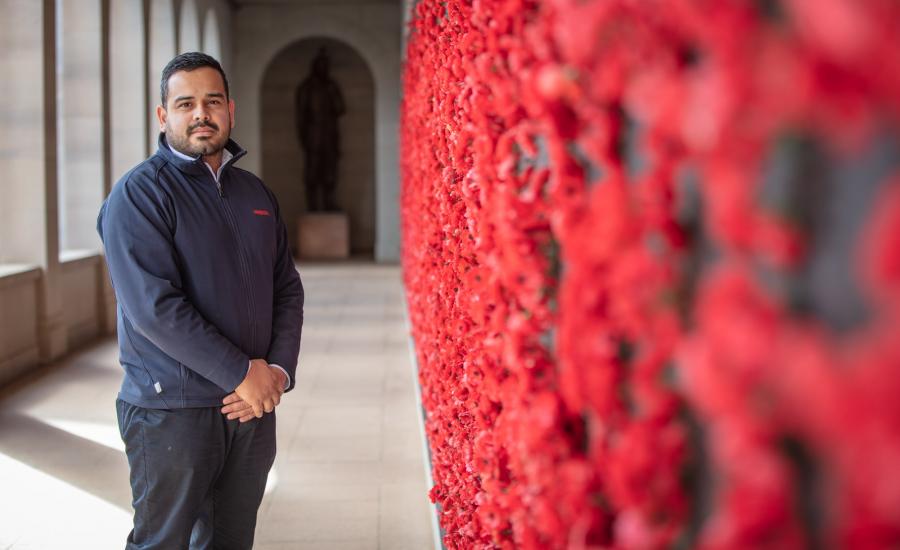
Oscar Comandari was five years old when his family fled war-torn El Salvador in the 1990s for a new life in Australia.
“It was just my mum, my three brothers and me,” he said. “We lost our dad to the civil war – he was a medic and he passed away.
“My mum lived through it all, and she would tell us stories about some of the things she’d been through and seen, and the family members that she’d lost.
“She was a teacher at the time, and the government were persecuting teachers, doctors, lawyers – anyone that could help the rebel cause – and so she applied to come to Australia as a political refugee.
“My mum said to the Australian government people that she wanted to get as far away from war as she could, so they sent us to Tasmania, and that’s where I grew up.
“I remember the aeroplane was a Qantas aeroplane and the stewardess gave us a little kids pack with a little colouring-in book of kangaroos with little pencils – and that’s the only thing I remember about the trip.
“We turned up with a suitcase with some clothes and we didn’t speak a word of English, and just within my lifetime, I’ve had opportunities that I could never dream of.
“People took us straight in, and we became Australians straight away. It was just fantastic, and I really love it here; Australia gave us a fantastic future.”
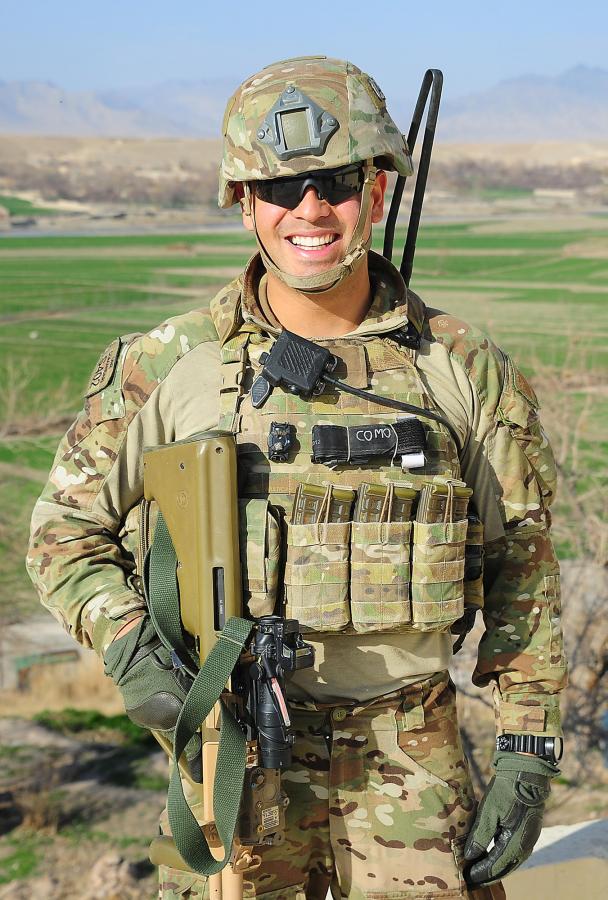
Oscar Comandari in Afghanistan: "Australia gave us a fantastic future.” Photo: Courtesy Defence
Determined to give back to the country that had given him so much, Oscar joined the Australian Army in 2009 and is now one of the veterans working on the Australian War Memorial’s $500m Development Project.
“I was always going to join the army,” he said. “The military has always been a part of our family history, so in a way I think it was always what I was going to do here.
“In primary school we were taught about the War Memorial and about the Anzacs and what people have done for us and I think that really resonated with me.
“I’ve always felt, even from when I was a little boy, that we owe a lot to this country, and so that became my dream job.
“In high school, I joined the army cadets, and that solidified it for me … I wanted to be in the army, no matter what, and I joined the army as soon as I could.”
He deployed to Afghanistan in October 2012 with 7RAR as part of Operation Slipper.
“My wife was in the army as well, and we had our first daughter just before I left,” he said. “I got to see her for two weeks, and then I went away [for eight months].”
He admits he was nervous about telling his mother that he was being deployed to Afghanistan. “She was amazing,” he said. “She just said to me, it’s your life, it’s your career, and if you feel strongly about serving your country, then do it – we’re a proud family, and we serve – and she gave me her blessing straight away.”
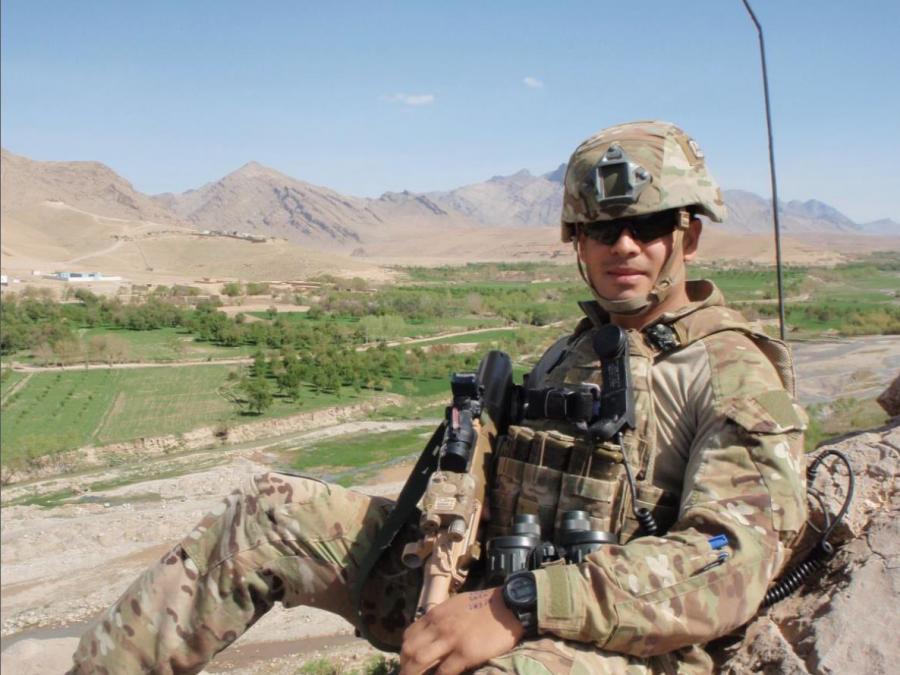
Oscar Comandari in Afghanistan: “I’ll never forget it." Photo: Couresy Oscar Comandari
In Afghanistan, Oscar was attached to an infantry platoon as an observer, providing security for AusAID diplomats and engineers.
“I’ll never forget it,” he said. “I arrived in Afghanistan just after we lost three Australian soldiers to an Afghan sergeant, so it was pretty intense to walk into a deployment knowing that three of our guys had just been taken away by someone we would consider a friend. It definitely brought it home, and it was quite a hard couple of weeks.
“There was one time that really struck me. I was about to walk through a bit of a park, and I saw what looked like a microchip, or a bit of cabling, sticking out of the ground.
“That definitely put a bit of lightning in my bones because I thought, ‘Oh, geez, this could be an IED; I might have just stepped on that and died.’
“It turned out to be nothing, but the threat was always there, and I think the fear was always there as well …
“I was lucky in that I was surrounded by people that I had worked and bled and sweated with over the last five years. They had my life in their hands and I was comfortable with that.”
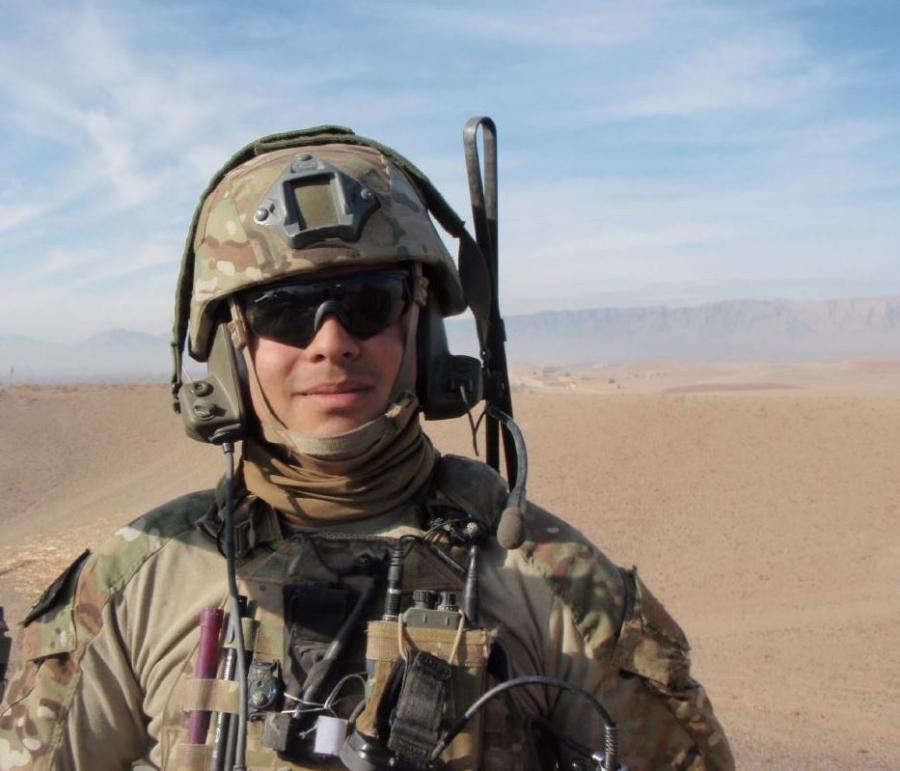
Oscar Comandari in Afghanistan. Photo: Courtesy Oscar Comandari
Rocket attacks were another constant threat during the deployment.
“For the first couple of months, our base got rocketed maybe once or twice a week,” he said. “You’d hear the alarms go off, and you’d hear the rockets go off, and you’d have to rush to the bunkers, to the safe areas.
“[The first time] you run quicker than you’ve ever run before – you are definitely sprinting – but you get used to it … and after a while, it didn’t faze you. You knew your drills … and when the alarm stopped and the all clear came over, you would go back to doing what you were doing before like nothing had ever happened.
“Within a couple of weeks I was going on at least five patrols a week, and that’s how it stayed for the whole deployment.
“I look back and the biggest thing I remember now is how safe I felt every time I put my body armour on. Without my body armour on I felt a bit naked, but as soon as I was getting ready to go out on patrol, and I put my body armour on, and felt the weight of it, in my mind, I was safe: ‘I’m okay, nothing’s going to happen to me today, I’ve got my armour on.’
“We’d go on patrol into the city of Tarin Kot a lot … and to begin with, the kids would always stay away from us, or look at us a bit differently, but then we went on one patrol, and for some reason I had a bag of lollies in my pocket.
“We came out and we saw some young kids, just little boys and girls, playing in the dirt, and my captain at the time said, ‘Why don’t you give them a lolly?’
“I’ll never forget handing out lollies to these kids, and the look that they would give you; it was like they’d never tasted a lolly before, and to them it was like the greatest thing in the world.
“That was a pretty special moment for me, just knowing that something as little as a lolly could make such a difference to someone.”
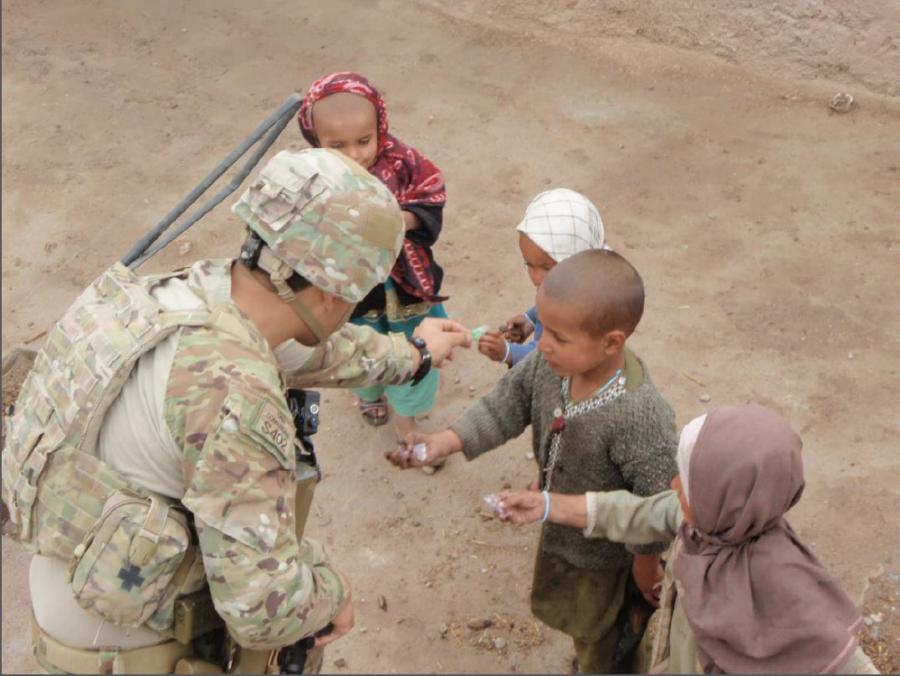
Oscar Comandari giving lollies to children in Afghanistan. Photo: Courtesy Oscar Comandari
For Oscar, it was one of many special moments during his time in Afghanistan.
“Looking back, there were a lot of good memories, so for me it was quite a positive deployment,” he said. “I think we were making a big difference … providing kids with schools, looking after the infrastructure, and just trying to make people’s lives a little bit better… It was a good feeling, and to me, that’s what Australians do; we help each other, and we help other people, especially in a time of need.”
Today, Oscar is a construction manager with mechanical construction company called Fredon Air and is proud to be involved in the Memorial’s new Development Project.
“The War Memorial to me is a sacred place … and I knew straight away I wanted to be here and work here,” he said. “When I come to the War Memorial and I look at the names on the wall, and the pictures in the galleries, and the exhibitions … I don’t know those people, but I have that sense of mateship with them; you’re one of me, I’m one of you, [and] that’s why this place is so special.”
As a young veteran, he believes it is important for the Memorial to tell the stories of modern conflicts and the men and women who have served and continue to serve.
“We need to tell those stories, and we need to tell them now,” he said. “We always learnt about conflicts from the past – World War One, World War Two, Vietnam – and it shaped the person I became because I knew that other people had sacrificed and been through a lot for this country, and I think we need to continue that.
“We need the War Memorial to show the rest of the country the things that people have done in their name, and the sacrifices that they’ve made – the time away from family, and the kids that are going to grow up without a mum or a dad.
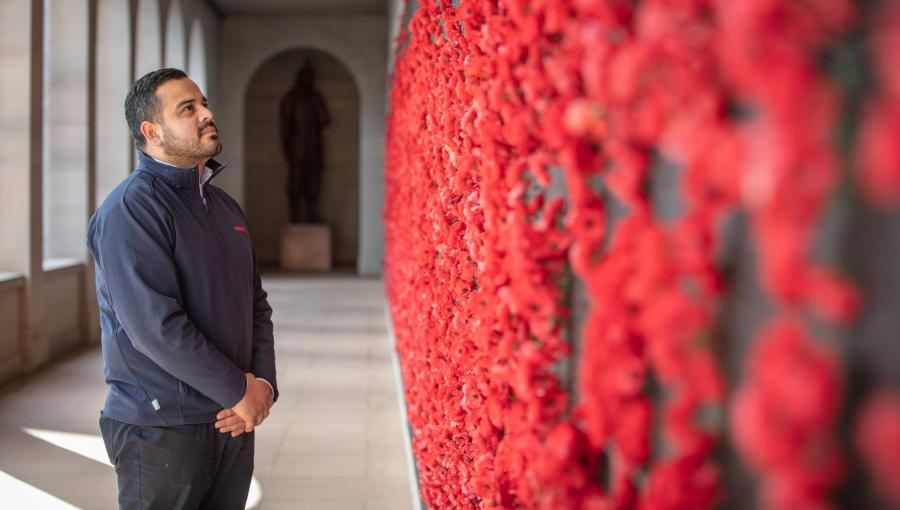
“There’s always been this fantastic recognition around our Anzacs, but our new veterans are Anzacs as well, so we need to tell their story as well, and we need to get that out.
“What helped me was telling my story, and I had my wife to tell that story to, but some people don’t have that… so I think knowing that there is a place dedicated to telling their story will help veterans.
“It’s not [just a building]; it represents so much more. It’s in our DNA this place, and it’s a part of who we are, so we need to invest in that, and maintain it, and develop it, and make it better and better.
“Knowing that I’ve done, even just a little bit, is amazing. It’s another dream come true to know that I’ve contributed to something as special as the War Memorial, and I think when it’s all finished, I’m going to be over the moon.
“I’m happy to be contributing; I’m proud to be contributing; and hopefully I’ve given back for the opportunities Australia has given me and my family.
“We’ve got bright futures in front of us, and it would not have been there without Australia taking us in … so my family in general feel we should serve and give back so that other people get the same opportunities in the future.
“That’s what means the most to me, so I think I always knew I wanted to serve, and I wanted to give back …I miss [the army] every day, and I think I always will, for the rest of my life.”
To learn more about the Memorial Development visit here.